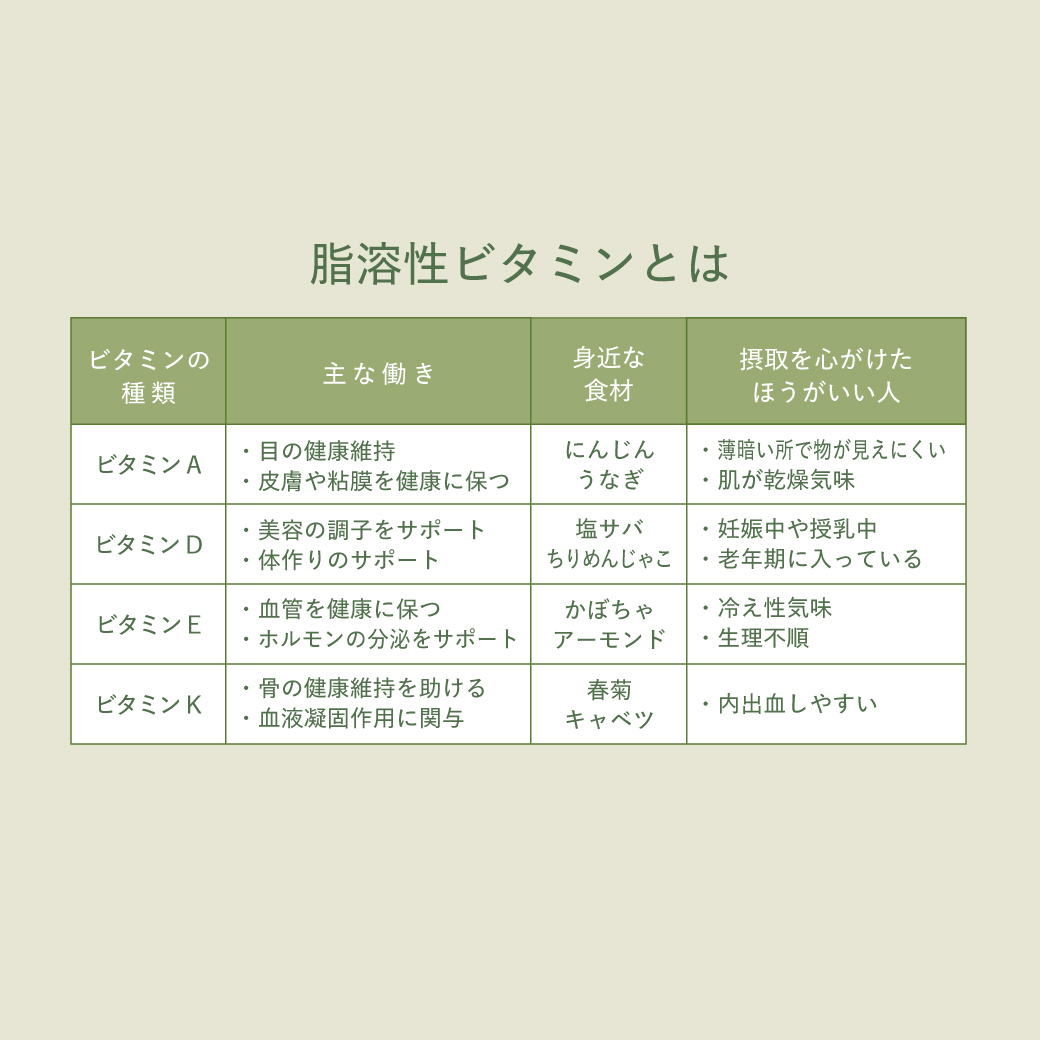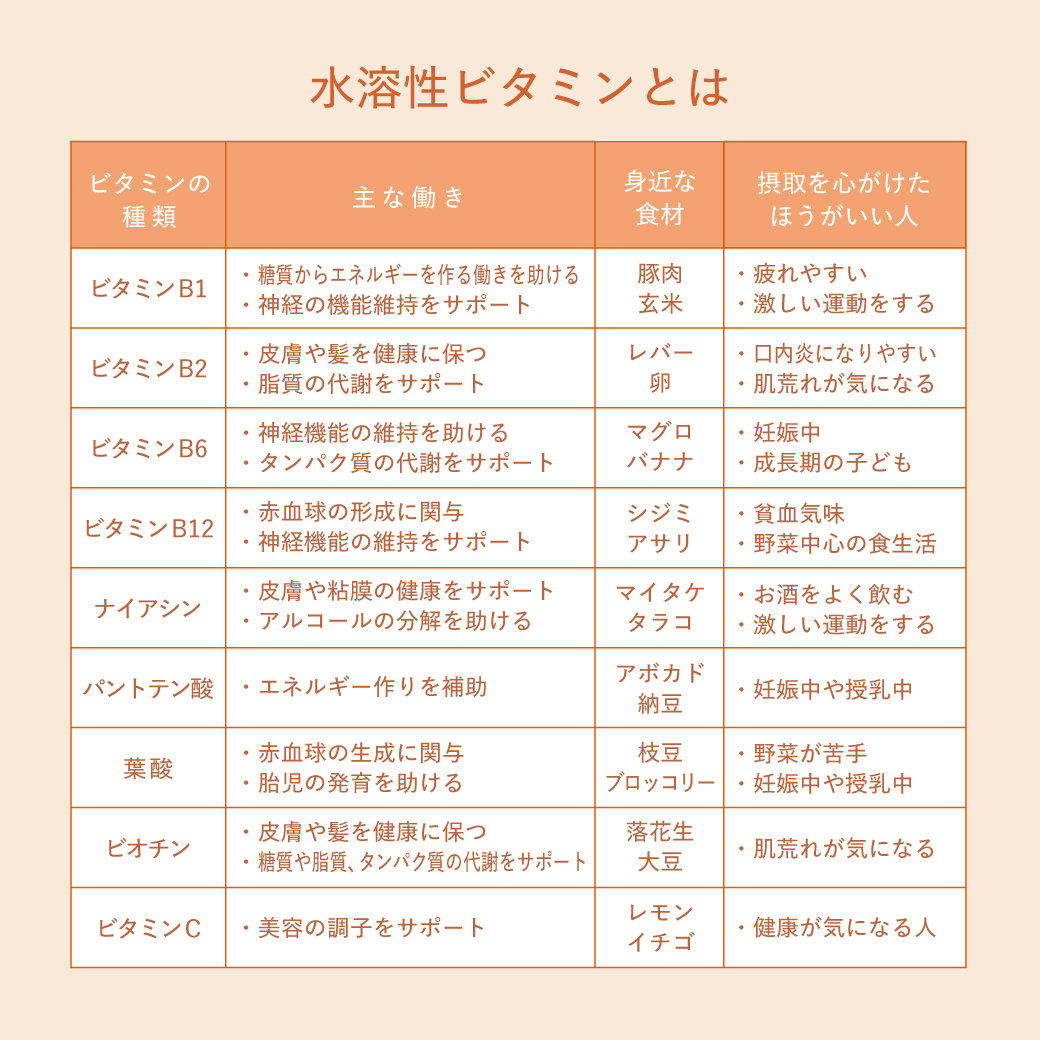
How many types of vitamins are there? Main functions and tips for taking it
SUMMARY
- ・How many types of vitamins are there in total? Why taking vitamins is important
- ・Types of vitamins and their main functions
- ・Tips for taking vitamins
- ・Understand the types of vitamins and take them evenly.
Carbohydrates, proteins, fats, vitamins, and minerals are essential nutrients for the human body. These are called the five macronutrients, and it is important to consume them in a well-balanced manner to maintain good health.
These vitamins have the function of regulating the body's health. However, even though we say "vitamins" in one word, there are many different types, so many people don't really know what kind of function they have or what foods they are found in. This article will tell you more about the types of vitamins. Make good use of vitamins and use them to maintain your daily health.
How many types of vitamins are there in total? Why taking vitamins is important
To begin with, "vitamin" is a general term for organic compounds that are essential for human life. There are many types of vitamins, each with different properties and functions. From here, we will explain in detail the types of vitamins and why they are essential for the body.
【reference】
“Vitamin” (e-Health Net)
https://www.e-healthnet.mhlw.go.jp/information/dictionary/food/ye-027.html
● There are 13 types of vitamins in total.
Vitamins are divided into two types: fat-soluble vitamins, which dissolve in oil, and water-soluble vitamins, which dissolve in water.
There are four types of fat-soluble vitamins: vitamin A, vitamin D, vitamin E, and vitamin K. Once ingested, it is stored in the liver and adipose tissue. While deficiency is unlikely to occur, it is thought that the risk of overconsumption is high.
There are nine types of water-soluble vitamins: vitamin B1, vitamin B2, vitamin B6, vitamin B12, niacin, pantothenic acid, folic acid, biotin, and vitamin C. It is easily soluble in water, and when ingested, it dissolves in body fluids such as blood. Excess is excreted through urine, so there is no need to worry about overdosing. On the other hand, water-soluble vitamins are difficult to store in the body, so it is important to take them regularly.
● Why daily vitamin intake is important
Most vitamins are not produced by the body, so it is important to get them from your daily diet. If you are deficient in vitamins, you may feel tired easily and your skin may become dry.
If you go on an unreasonable diet or follow an unbalanced diet, you may become deficient in vitamins. In order to live a healthy life, it is better to consciously take vitamins.
Is nutritional deficiency related to rough skin? Foods you should eat for beauty and health
Types of vitamins and their main functions
Fat-soluble vitamins and water-soluble vitamins have different functions. By knowing the characteristics of each, you will be able to figure out which vitamins you need. From here, we will introduce the function of each vitamin, common foods, and people who should be careful about their intake.
● fat soluble vitamins
Has the property of being easily soluble in oil
It easily accumulates in the body, so you need to take care to consume the appropriate amount.

Vitamin A is a nutrient primarily involved in eye and skin function. Retinol and tretinoin, which are commonly used in cosmetics, are a type of vitamin A.
Vitamin D is an essential nutrient for living a healthy life. Vitamin D is synthesized in the body when exposed to sunlight. If you don't go out often, you may become deficient in vitamin D, so people who spend a lot of time at home should actively take in vitamin D.
Vitamin E is a component related to blood and hormones. It helps create beautiful skin as it promotes blood circulation. Vitamin E is an ingredient that people who want to improve their skin condition should actively consume.
Vitamin K is a necessary component to create blood clotting factors, which clot blood during bleeding. For this reason, it is sometimes called the "hemostatic vitamin." If you follow a normal diet, you are unlikely to be deficient. However, people with reduced absorption capacity, such as the elderly or people with liver problems, may be deficient in vitamin K.
● water soluble vitamins

There are nine types of water-soluble vitamins: vitamin B group (B1, B2, B6, B12, niacin, pantothenic acid, folic acid, biotin) and vitamin C.
Vitamin B group is a nutrient involved in metabolism. Of the eight types of B vitamins, vitamins B1, B2, and B12 are recommended for people who want to recover from fatigue.
Vitamin B1 is a nutrient that promotes carbohydrate metabolism. Vitamin B1 is also called the "vitamin that helps relieve fatigue."
Vitamin B2 is a nutrient involved in the metabolism of carbohydrates, lipids, and proteins, and energy production. It is essential for promoting growth as it helps maintain the health of the skin and mucous membranes. Children who are active and people who play sports should actively consume it.
Vitamin B12 is a nutrient necessary for making blood. It also has the effect of keeping the nerves normal. People under the age of 50 tend to be deficient, so it is a good idea to actively consume them.
Vitamin C is a nutrient that regulates health and beauty. Vitamin C cannot be synthesized in the body, so it must be obtained from the diet. It is a nutrient that is easily deficient, so it is a good idea to actively consume it.
Tips for taking vitamins
The effective way to take vitamins varies depending on the type. If you want to consume the same amount, you want to do it in a more efficient way. Here are some tips on how to properly take in vitamins.
● Cook according to the properties of the vitamins
Fat-soluble vitamins dissolve easily in oil, so cooking with oil improves absorption. It is also relatively heat resistant, so the vitamins are not easily destroyed even when heated. If you want to efficiently take in fat-soluble vitamins, we recommend frying them in oil. Specific examples include carrot kinpira and hotpot meat.
On the other hand, water-soluble vitamins dissolve easily in water and are sensitive to heat, so it is best to eat them raw as much as possible. Examples include fruit salads and smoothies.
Also, if you boil the ingredients, we recommend a menu that allows you to consume the boiled water. Specifically, there are cream soups and pot-au-feu.
● Make sure to eat a well-balanced diet
Even if you only take one nutrient, it will not work properly in your body. To maintain good health, it is important to take in even amounts of the five major nutrients.
In addition, consuming a variety of well-balanced nutrients can also improve the absorption efficiency of vitamins. A synergistic effect can be expected by taking vitamin B6 and protein, vitamin A and zinc, etc. in combination.
● Replenish the vitamins you tend to lack with supplements
There are many types of vitamins, and it may be difficult to get all 13 types evenly from your diet. That's why we recommend supplements. Supplements allow you to easily supplement your diet with nutrients that are lacking in your regular diet.
Understand the types of vitamins and take them evenly
In this article, we mainly explained the types of vitamins. There are 13 types of vitamins, each with different expected effects. It is important to understand the types and effects of vitamins and take them in a well-balanced manner.
However, even if you know which foods are rich in vitamins, it may be difficult to actually get them from your diet. If you are concerned about nutritional deficiencies, we recommend supplements. By adding it to your daily meals, you can easily supplement the nutrients you lack. Use supplements wisely to help maintain your daily health.
Article supervision

Director of Elm Clinic Azabu-in
Mr. Ayuori Yokoyama
Elm Clinic Azabuin
After graduating from Hiroshima University School of Medicine, he worked at JCHO Tokyo Shinjuku Medical Center, etc., and is currently the director of Elm Clinic Azabu-in.








